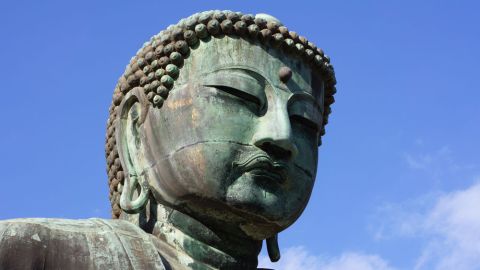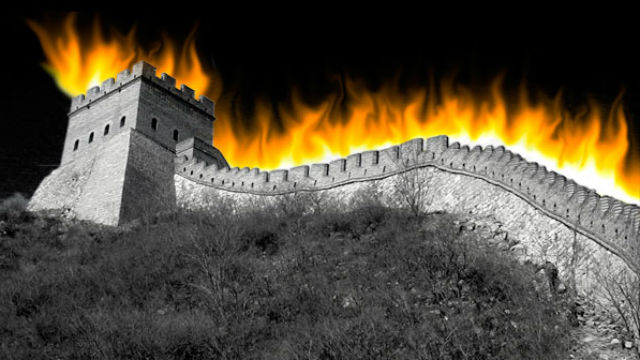Slavoj Žižek on Buddhism and the Self

Editor’s note: The following is an edited excerpt from Slavoj Žižek’s book, “Less Than Nothing: Hegel and the Shadow of Dialectical Materialism.”
[One of the only schools] of thought that fully accepts the inexistence of the big Other is Buddhism. Is the solution then to be found in Buddhist ethics?
There are reasons to consider this option. Does not Buddhism lead us to “traverse the fantasy,” overcoming the illusions on which our desires are based and confronting the void beneath each object of desire?
Furthermore, psychoanalysis shares with Buddhism the insistence that there is no Self as a substantive agent of psychic life: no wonder Mark Epstein, in his book on Buddhism and psychoanalysis, refers positively to Lacan’s early essay on the “mirror stage,” with its notion of the Ego as an object, the result of the subject’s identification with the idealized fixed image of itself:71 the Self is the fetishized illusion of a substantial core of subjectivity where, in reality, there is nothing.
This is why, for Buddhism, the point is not to discover one’s “true Self,” but to accept that there is no such thing, that the “Self ” as such is an illusion, an imposture. In more psychoanalytic terms: not only should one analyze resistances, but, ultimately, “there is really nothing but resistance to be analyzed; there is no true self waiting in the wings to be released.”72 The self is a disruptive, false, and, as such, unnecessary metaphor for the process of awareness and knowing: when we awaken to knowing, we realize that all that goes on in us is a flow of “thoughts without a thinker.”
The impossibility of figuring out who or what we really are is inherent, since there is nothing that we “really are,” just a void at the core of our being. Consequently, in the process of Buddhist Enlightenment, we do not quit this terrestrial world for another truer reality — we just accept its non-substantial, fleeting, illusory character; we embrace the process of “going to pieces without falling apart.”
In the Gnostic mode, for Buddhism, ethics is ultimately a question of knowledge and ignorance: our craving (desire), our attachment to terrestrial goods, is conditioned by our ignorance, so that deliverance comes with proper knowing. (What Christian love means, on the contrary, is that there is a decision not grounded in knowledge—Christianity thus breaks with the entire tradition of the primacy of Knowledge which runs from Buddhism through Gnosticism to Spinoza.)
Crucial to Buddhism is the reflexive change from the object to the thinker himself: first, we isolate the thing that bothers us, the cause of our suffering; then we change not the object but ourselves, the way we relate to (what appears to us as) the cause of our suffering: “What was extinguished was only the false view of self. What had always been illusory was understood as such. Nothing was changed but the perspective of the observer.”73
This shift involves great pain; it is not merely a liberation, a step into the incestuous bliss of the infamous “oceanic feeling”; it is also the violent experience of losing the ground under one’s feet, of being deprived of the most familiar stage of one’s being. This is why the path towards Buddhist Enlightenment begins by focusing on the most elementary feelings of “injured innocence,” of suffering an injustice without cause (the preferred topic of narcissistic, masochistic thoughts: “How could she do this to me?I don’t deserve to be treated that way”).74
The next step is to make the shift to the Ego itself, the subject of these painful emotions, rendering clear and palpable its own fleeting and irrelevant status—the aggression directed against the object causing the suffering should be turned against the Self itself. We do not repair the damage; rather, we gain the insight into the illusory nature of that which appears to need repair.75
71 Epstein, Thoughts Without a Thinker, p. 152.
72 Ibid., p. 121.
73 Ibid., p. 83.
74 Ibid., p. 211.
75 Although, even here, there is a fundamental ambiguity in the Buddhist edifice: is the goal of the Buddhist meditation nirvana as the shift in the subject’s stance towards reality, or is this goal the fundamental transformation of reality itself, so that all suffering disappears and all living beings are relieved of their suffering? That is to say, is not the effort to enter nirvana caught between two radically opposed extremes, the minimalist and the maximalist? On the one side, reality remains as it is, nothing changes, it is just fully perceived as what it is, a mere insubstantial flow of phenomena that does not really affect the void at the core of our being; on the other side, the goal is to transform reality itself so that there will be no suffering in it, so that all living beings will enter nirvana.
Image courtesy of Shutterstock/wimmamoth.





